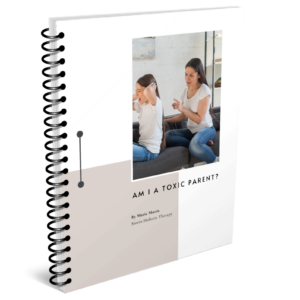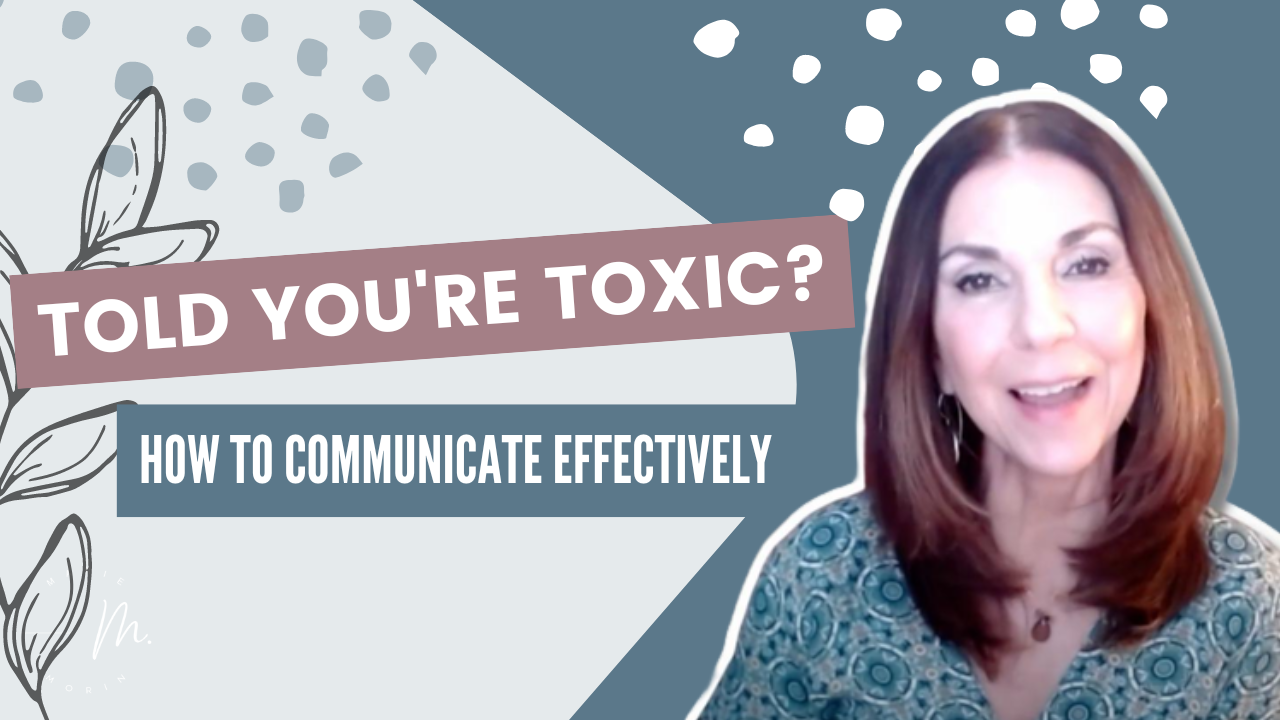If your relationship with your adult child is cut-off or strained, chances are there have been communication blunders by all parties. It happens in all families, but some families take it to harmful levels.
Unfortunately, when tempers and behaviors are unchecked, they can quickly escalate into toxic behaviors. Unraveling the results of poor communication requires skills to respond to build connections. Mindfulness, daily calming practices, and self-compassion is the foundation for building a bridge with your loved one. This article discusses Three Keys to Effective Communication When You’re Told You’re Toxic.
Communication becomes challenging when messages mixed with toxic behaviors permeate the relationship. Consistently expressed toxic behaviors include Angry fits, disrespectful comments, criticizing, blaming, and failing to apologize. Not all exchanges are toxic; people yell, deny, and get defensive. Toxic behaviors are relentless and are typically the norm for the relationship.
What if you’ve been told you’re toxic, recognize these behaviors, and hope to improve the relationship? The most crucial step is to acknowledge that your approach needs to change. We often go into conversations and confrontations white-knuckling it. You think that you can keep our cool out of a sheer will. The problem with this strategy is that no matter how hard we try, unless we are emotionally regulated beforehand, we can likely get caught back into our old communication methods. We need more than our determination to deal with potentially offensive or hurtful comments.
Effectively communicating when we desire connections means we are more concerned with the other person being heard than with making our point or being right. Primary communication is exchanging more than ideas, comments, and information. Behind social interactions, especially in families, is connection. Relationships that are connected share an alliance, a common interest in desiring the best for the individuals and the relationship.
Indeed, we also want to be heard, but we don’t stand a chance unless we give our family members the respect to speak without our defensive remarks. If the goal is to build a bridge back to your loved one, it’s up to you to do the work.
Three Keys To Communicate Effectively
1.Be Mindful
Pay attention to your emotional state. Take note of your physical sensations when you think about your estranged adult child. Take your emotional temperature and determine what you are feeling. What will trigger me? Will I choose to react or respond? Mindfulness is simply paying attention to your thoughts and emotions nonjudgmentally. You stop and notice how your body reacts to the notion that we will be speaking to your family member. Practicing mindfulness helps you to be alerted to stress signals so you can manage them.
Consider other opportunities that you’ve had to converse with someone you might expect to be agitated. You’re likely anticipating some anxiety about the exchange. Maybe you felt nervous and uncomfortable. When you are mindful, it brings the responsibility of your reactions forward. You get to choose how you will speak, and rather than reacting, you respond.
2. Daily Calming Practices
Calming techniques can take different forms. Choose from practices such as prayer, meditation, Yoga Nidra, Yoga, and Qi Gong, essential self-care such as sleep hygiene, social engagement, eating well, being hydrated, and regular movement practice. Diaphragmatic breathing, four-seven-eight, and four-four-four are excellent practices to teach the body to calm. We practice so we are familiar with the benefits of calm and can find it quicker.
3. Practice Self-Compassion
Practice communicating with an attitude of self-compassion
Your effective communication with a challenging relationship is in your control. You cannot predict or control others’ behaviors, only your own. How will you respond? You may be caught off guard and, in a moment, say something less than your best. You may tend to criticize your imperfections and broken standard of yourself.
Self-compassion recognizes that we are imperfect, make mistakes, and will try again. Create a habit of acknowledging that you are doing your best. An atmosphere of compassion for yourself is more beneficial than getting down on yourself.
Compassion means we treat ourselves as we would a good friend. We would never chastise our friend for having a bad day. Why not give the same grace to ourselves?
Validate what your adult child is telling you.
Validation works like this: You listen more than you speak; you acknowledge what you have heard, then you paraphrase back what you have heard.
When you validate, you’re not judging or trying to fix; you’re not defending. You are accepting the speaker’s feelings as legitimate and genuine. When someone is validated, they feel heard and understood.
To be effective, you need an open mind and empathize with your adult child’s feelings.
It is not uncommon not to know how to validate. It requires one to be mindful of one’s emotions and be willing to sit with the discomfort of another’s.
When someone feels validated, they feel safe and comfortable in your company.
Validating responses include:
- What I’m hearing you say is _______________
- This must have made you feel really hurt, angry, disappointed or sad
- I understand that you are very upset, hurt, angry, anxious
- This must have been really hard on you.
Estrangement is tough on parents and their adult children; please get the professional support you need to manage the distress you are experiencing.
Be mindful of your body language.
Your body language needs to be open and receptive. Think about your facial expressions and your posture.
Most of our communication happens with body language and less with what we say.
Be mindful of the tone in which you speak.
Soften the way you speak. If you are feeling anxious or angry, chances are your tone will spell that out to your adult child.

Am I a Toxic Parent?
TAKE THE QUIZ!
Fill out the form below to let us know where to send your quiz:
Complicated Communication
Effective communication is a skill, but it also considers one’s ability to tolerate receiving hurtful or threatening information. We can be triggered by someone’s comments, especially if the receiver has experienced trauma. For this reason, it is essential to process areas where one is activated with a therapist. Skillful communication involves exchanging information while being able to receive it without reacting.
When one is triggered, they cannot depersonalize—personalizing leads to reacting rather than responding. Indeed, if someone is telling us hurtful things, it feels very personal. Listening to what is being said while having the ability to detach and recognize the message is the perception of the speaker is possible.
With practice, one can be calm enough to hear without defending and arguing. This does not mean that you might not feel hurt or upset. However, for the goal of connection, you provide a place of safety and compassion for the experience the speaker shares.
In time, as the speaker believes they can honestly share, the communication tension may diminish. It only takes one person in the relationship to change the dynamic. You might be thinking, what about what I would like to say?
If you are hoping to build a bridge with your adult child, listening without defensiveness and arguments is how it begins.
Since the level of investment for parents is much more than the adult child, it will be up to you to do the listening. Parents of cut-off children deserve and need to be heard, but giving your kid a piece of your mind will likely backfire. Find a therapist specializing in estrangement who can help you sort and process the emotional turmoil that being cut off entails.
If your adult child is toxic or abusive, boundaries are necessary, and the support of a professional. In all cases of estrangement, when there are harmful or abusive behaviors, cutting off occurs as a matter of self-preservation.
Estrangement When There is Abuse
When there is a history of abuse, the notion of reconciling requires the professional guidance of a therapist and insight into the abuser’s recognition of their behaviors. More to the point, therapeutic work is essential for both parties and ensures future emotional and physical safety. Kylie Agllias, researcher, and educator, in her book Family Estrangement A Matter Of Perspective, explains that commitment, insight, and integrity are needed to reestablish trust.
What You Need To Know About Abuse
Toxic Behaviors
Toxic behaviors and estrangement can alter one’s mental state. Specifically, children raised in a toxic home will suffer psychological harm. Harmful behaviors include repeated encounters with a family member who is overly reactive and self-centered, consistently disapproving, and discouraging. They can be exploitative, inability to assume responsibility for their actions, dismissive of the other’s thoughts and feelings, disrespectful of other’s boundaries, disregard others by humiliation, and psychologically manipulating to create doubt in the other’s sanity.
Families At their Worst
Abused family members carry an enormous burden. Cutting off is acting self-preservation and self-defense. Toxic behaviors include the abuser standing too close to by frightening and denying the right to sleep. In addition, the abuser remarks that the abused cannot do or say anything right, blaming the victim for the abuse, invading privacy by reading mail or texts, monitoring calls, and telling others private information about the abused. The lengthy list of potential abusive behaviors family members impose parallels the harmful impact their behaviors unleash on the victim.
Survivors of abuse are more likely to suffer depression and anxiety and commit suicide. They are at greater risk for mental illness, post-traumatic stress disorder, substance use disorder, complex trauma, and attachment and social difficulties. The long-term consequences can be staggering. Thirty percent of abused individuals become abusers.
Conclusion
Heightened emotions and poor communication mark strained adult-child parental relationships. When parents are toxic, adult children leave the relationship to preserve themselves. Practical skills prepare one for potentially challenging exchanges.
Parents invested in reconciling with their adult children benefit by learning communication. Mindfulness, daily calming practices, and self-compassion is the foundation for building a bridge with your loved one. This article discusses Three Keys to Effective Communication When You’re Told You’re Toxic.









